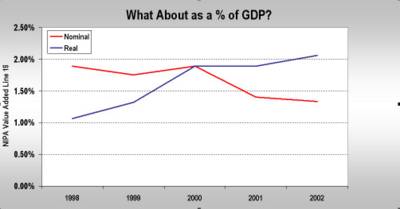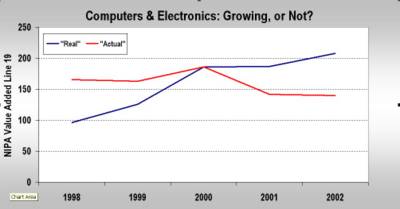Note - from June 24th 2009, this blog has migrated from Blogger to a self-hosted version. Click here to go straight there.
I've blathered on about the process of hedonic adjustment by which the GDP numbers for the US are (how can I put it diplomatically?) fudged beyond recognition.
All this malarkey about how US GDP is growing at such-and-such a rate, and how profits are rising at thisand-such a speed; to be blunt, it's bullshit.
There - two weeks in, and my first proper "swear". Hopefully it will be at least another two weeks before I drop the F-bomb; my problem is that for the most part I write as I think. Plus, I think I'm amusing.
Back to GDP.
The chart below is the "peek behind the curtain". It shows line 19 of the Bureau of Economic Analysis "Value Added by Industry" table.
Line 19 is the value added by Industry for an indutry called "computers and electronic products". This is the industry where the chicanery is worst.
The blue line is the number that goes into "Real"GDP, and the red line is the number that goes into Nominal GDP. Note that the red line has been more or less static since 1998 (it's declining, actually - by 24% since 2000).
Oddly, the "Real" number has more than doubled over the same time period. In short, the numbers appear to be saying that "Real" quantities of computers and so forth (you might think of things like "unit shipments") have doubled, while their prices have fallen by more than 50%.
However if you did think of things like "unit shipments" and you looked up some data on computer unit shipments, you would see that unit shipments have in fact fallen since 1999. So no joy there.
The awful truth is that the BEA counts computers based on a completely subjective "quality adjusted" method. They pretty much assert that a 2004 PC is almost ten times as good as a 1992 PC. In my view that is massively deceptive, since 99% of personal computers are used as typewriters and little more (web browsers too - I admit). So all that extra "grunt" is basically idle.
It's like saying that a 2004 car is X times (X>1) a 1980 car simply because it is capable of going faster. The fact that the thing never goes more than 10km/hr over the speed limit is irrelevant.
It would also be like claiming that a machine which was running at 25% capacity should have its productivity measured as if it was running 24 hours a day.
The very deep dishonesty of this approach is even better reflected in the percentage of GDP numbers. Whereas actual value added (a proportion of which represents payments to capital... i.e., profits) has declined as a proportion of GDP from a little under 2% to a little under 1.5%, "pretend" profits have risen from a little over 1% of GDP to a little over 2%.
So a 0.6% decline turns into a 1.1% increase in the GDP share of computers and associated stuff. That is a 1.7% turnaround, and it goes to nobody. It doesn't go to producers in the form of profits; it is "free consumer surplus".


So in short "Real" GDP is at least 1.7% overstated simply as a result of hedonic adjustment of personal computers.
Other items which are hedonically adjusted include health care - in short if you can pretend that health care is getting qualitatively superior, then the rapid price inflation in that sector is muted (because you pretend that people are actually consuming "more" health care.
At the end of the day, the "miracle economy" and the "productivity gains" which are touted hell, west and crooked, are overstated. I note that other governments are rushing to implement hedonic adjustment as well - in true Orwellian fashion they think that their electorates will simply accept government statistics as Gospel... after all it works for the U.S....
It worked for the Soviet Union for a while, too. But eventually people find out that they are actually getting poorer... where is the "economic miracle" in a system that results in 1 person in EIGHT living below the poverty line?
Note - I am as suspicious as anybody about government-authored "poverty lines": our system produces very little "absolute" poverty [where people die through lack of calories]... but if governments measure poverty in such-and-so a way, then poverty in the United States hits one person in EIGHT.

